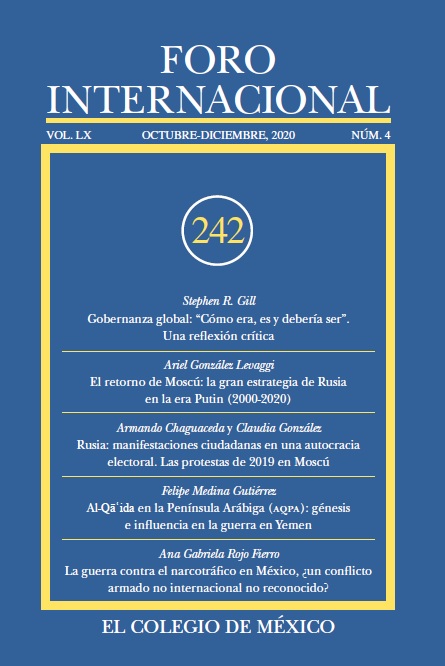Global Governance. As It Was, Is, and Ought to Be.
DOI:
https://doi.org/10.24201/fi.v60i4.2800Keywords:
global governance, world order, global capitalism, survival of humankind, biosphere, sustainable planetary governanceAbstract
This essay reflects on the past, present, and potential future of global governance, its historical practices and principles, the interests it has served, and who/what it has included/excluded or marginalized. It initially explores ontological, conceptual, and normative issues, and how these have been historically connected to the dynamics of world orders, patterns of global governance, and global capitalism. It reflects on developments from the eleventh century up to World War II and critically appraises presently dominant principles and practices of global governance—in order to highlight key questions concerning the future. The essay asks whether current practices are in contradiction to the material and human interests and indeed the very survival of humankind and the integrity of the planet, its biosphere, and its life-forms. It concludes by identifying some forms of political agency that might help reshape governance towards more equitable, socially just and sustainable planetary governance.
Downloads
References
ARRIGHI, Giovanni, “The Three Hegemonies of Historical Capitalism”, en Stephen Gill (ed.), Gramsci, Historical Materialism and International Relations, Cambridge, University Press, 1993, pp. 148-185. DOI: https://doi.org/10.1017/CBO9780511558993.007
BAKKER, Isabella y Stephen GILL (eds.), Power, Production and Social Reproduction: Human In/security in the Global Political Economy, Londres, Palgrave Macmillan, 2003. DOI: https://doi.org/10.1057/9780230522404
BRAUDEL, Fernand, The Perspective of the World, trad. de Siân Reynolds, Nueva York, Harper & Row, 1992, 3 vols.
BUCHANAN, James H., The Economics and Ethics of Constitutional Order, Ann Arbor, Michigan University Press, 1991, pp. 1-64. DOI: https://doi.org/10.3998/mpub.13054
COX, Robert W., “Social Forces, States and World Orders: Beyond International Relations Theory”, Millennium, vol. 10, núm. 3, 1981, pp. 162-175. DOI: https://doi.org/10.1177/03058298810100020501
GILL, Stephen, “Globalisation, Market Civilisation and Disciplinary Neoliberalism”, Millennium, vol. 24, núm. 3, 1995, pp. 399-423. DOI: https://doi.org/10.1177/03058298950240030801
GILL, Stephen, Power and Resistance in the New World Order, Londres, Palgrave Macmillan, 2008. DOI: https://doi.org/10.1057/9780230584518
GILL, Stephen (ed.), Critical Perspectives on the Crisis of Global Governance: Reimagining the Future, Londres, Palgrave Macmillan, 2015.
MOORE, W. Jason, Capitalism in the Web of Life, Londres, Verso, 2015.
MURPHY, Craig, International Organization and Industrial Change: Global Governance since 1850, Cambridge, UK, Polity, 1994.
POLANYI, Karl, The Great Transformation: The Political and Economic Origins of Our Times, Boston, Beacon Press, 1944.
RAVAL, Anjli y Attracta MOONEY, “Money Managers: The New Warriors of Climate Change”, The Financial Times, 26 de diciembre de 2018.
THOMPSON, Edward Palmer, The Making of the English Working Class, Londres, Gollancz, 1968.
VAN DER PIJL, Kees, Transnational Classes and International Relations, Londres, Routledge, 1998.
VON HAYEK, Friedrich August, “The Principles of a Liberal Social Order”, en C. Nishiyama y K. R. Leube (eds.), The Essence of Hayek, Stanford, Hoover Institution Press, 1984, pp. 363-381.













